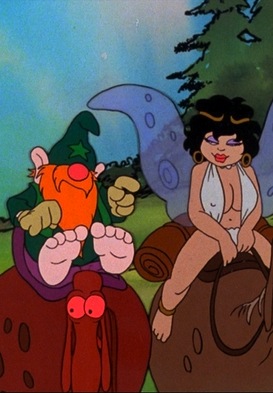Monday, March 21, 1977.
WIZARDS. Music by Andrew Belling. Written, produced and directed by Ralph Bakshi. Running time: 80 minutes. Mature entertainment with the B.C. Classifier's warning: some violent scenes.
RALPH BAKSHI HAS BEEN marking time. After three precedent-shattering cartoon features — 1972's Fritz the Cat, 1973's Heavy Traffic and Coonskin (1975) — the 38-year-old animator has produced a film that is surprisingly tame in both its tone and technique.
There was nothing tame about his feature debut. Based on Robert Crumb's underground comic book characters, Fritz the Cat was the first cartoon feature to get a U.S. X-rating. It was banned for nearly a year here in B.C.
A year later, he managed to top himself with the brilliantly original Heavy Traffic. Based loosely on Hubert Selby, Jr.'s contentious novel, Last Exit to Brooklyn, it was Bakshi's own creative, semi-autobiographical search for his roots.
In 1975, Bakshi went too far for commercial comfort. Coonskin was a sly, uncompromising parody of Disney's 1946 film Song of the South that shifted the Uncle Remus stories into the urban black ghetto. The National Association for the Advancement of Colored People (NAACP) was not amused, and the chill was felt at the box office.
Wizards, his current film, is unlikely to offend anyone. A sword and sorcery fantasy, it is set in a far distant future, 10 million years after a nuclear holocaust. It is a world of elves, fairies and malevolent mutants.
The narrator (Susan Tyrrell) introduces Queen Delia, the beautiful young mother of twin sons. One grows up to become Avatar of Montagar (voice of Bob Holt), the good wizard who embodies the positive virtues of love, beauty, nature and magic.
The other becomes Blackwolf (Steve Gravers), an evil sorcerer. In an early battle, Avatar banishes his brother to Scortch, land of the mutant goblins, where Blackwolf rediscovers the destructive powers of science and technology.
Their story opens with Blackwolf sending his assassin, Necron 99 (David Proval) to kill Montagar's president. It is a mission that the red-uniformed robot accomplishes before being struck down by the aging Avatar.
Revived and renamed "Peace,'' the former killer joins the good wizard, along with Elinore (Jesse Wells), the president's orphaned daughter, and Weehawk (Richard Romanus), a brave young elf, on a Tolkienesque quest to destroy Blackwolf and restore happiness to the world.
Visually, Wizards is almost as eclectic as the recent Japanese cartoon feature, Belladonna. Bakshi soaks up influences like a sponge, offering whole sequences that suggest his enthusiasm for particular artists and their styles.
The film's bridging scenes — drawings that appear to have been part of the original storyboard — are credited to comic-book artist Mike Ploog, who works in a style reminiscent of the great Wally Wood. (Indeed, Wood and Bakshi were involved last year in negotiations to bring Wood's graphic novel, World of the Wizard King, to the screen.)
Wizards owes much to the world of the comics. Avatar, for example, is closer to Crumb's Mr. Natural character than to anything in Tolkien. Necron 99 is pure Vaughn Bodē, and Elinore's costuming is borrowed from Vampirella.
And so it goes. With an occasional nod to the past — Weehawk and the playful fairies are right out of Fantasia's Pastoral Symphony section — Bakshi has created another impressive-looking film that is completely fascinating to watch. There is no faulting the craftsmanship of his crew.
The disappointing thing about Wizards is its lack of a consistent mood. The styles, interesting as they are in individual scenes, do not mix well. Like a shadow-boxing prize fighter, Bakshi bobs and weaves to no apparent purpose.
It could be that the director had no clear idea, no coherent storyline in mind when he started work on the film. More likely, he is experimenting and working out strategies for the most important film of his career.
And what might that be, you ask? A small note in a mid-February issue of Variety tells the tale. On January 17, Bakshi Productions started work on a feature film adaptation of J.R.R. Tolkien's fantasy best-seller, The Lord of the Rings.
It was a project that the Disney Studios wanted. Ralph Bakshi got it, though.
Wizards may be his test run and, for the public, a preview of things to come.
The above is a restored version of a Province review by Michael Walsh originally published in 1977. For additional information on this archived material, please visit my FAQ.
Afterword: Despite being given only limited release by Twentieth Century Fox, Wizards quickly made back its estimated $2 million budget and restored Bakshi's reputation for producing successful films. Less than two years later, just in time for Christmas 1978, The Lord of the Rings was released. As I noted in the Afterword posted with my review of that picture, funding for a sequel was not forthcoming from United Artists, despite its commercial success. The animator returned to more personal projects. These included 1982's Hey Good Lookin', his 1983 collaboration with fantasy art legend Frank Frazetta, Fire and Ice, and the ambitious marriage of live-action with animated filmmaking, Cool World (1992).
See also: In 1978, shortly before the release of The Lord of the Rings, United Artists invited critics to Los Angeles to preview the film and meet with its maker, Ralph Bakshi. For me, the encounter resulted in an interview/profile that appeared in the December issue of Vancouver Magazine.
